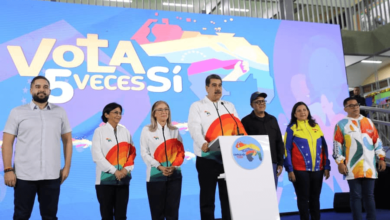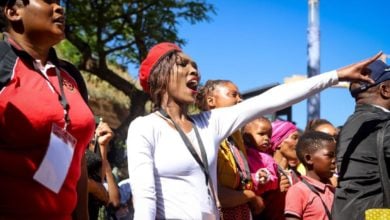There are few moments in one’s life that have such power that they change it forever. Similarly, there are few leaders who have the power to synthesize an entire people’s hopes, dreams and aspirations in such a brilliant way that their loss is felt in ripples across the globe. The loss of Venezuelan President Hugo Chávez had such an impact. That I got to witness the mourning of the Venezuelan people first hand in the days following his untimely death is something that will never leave me. It has left its imprint on my heart and my life’s work forever.
As a journalist from the United States now living in the heart of Europe, exposure to the idea that modern capitalism is “the end of history” or the best possible social order is commonplace. With the fall of the Communist governments in Eastern Europe between 1989 and 1991, the dominant idea has been that socialism is utopian and can never truly be attained.
Status quo was unsustainable
However, for my generation, revolution lives. It was given great impetus beginning in 1999 after the election of a leftist leader in Venezuela by the name of Hugo Chávez. He didn’t immediately proclaim the ideals of socialism but was brought to office because the impoverished people of his country decided that enough was enough—the status quo that regarded the majority in Venezuela as unworthy was unsustainable. No longer could the United States continue to hold Venezuela as a neo-colony to be used for its oil reserves while people went hungry and were illiterate. The Bolivarian Revolution was about to begin, and would change the world forever.
On March 6, I briefly stopped over in Miami, Fla., en route to Caracas. Seeing the U.S. mainstream newspapers on display at the airport was quite difficult. Of course, they were filled with statements about the death of Chávez and how he was a “dictator”—despite being re-elected again, and again, and again.
On the three-hour flight from Miami International, I sat next to several Venezuelans who shared similar sentiments to those expressed in the U.S. papers. It was clear after engaging with them for a few minutes that they represented the Venezuelan middle-class, which had one of the highest standards of living in the world when Chávez assumed office. They were in an almost celebratory mood over El Comandante’s passing. I felt quite repulsed knowing that I was among people who had too much invested in the unfair capitalist order to see that the revolution was bringing about a far more equitable and just society.
The young man next to me had just traveled to Harvard University to apply there, because he felt as if his degrees from Venezuela would not be “good enough” if the revolution continued. This is despite the fact that education has only become a human right since Chávez assumed office, and is no longer simply the “property” of a handful of privileged sons and daughters of the bourgeoisie. I felt pity for the young man, who was a quite nice (albeit clueless) human being. He helped me with my immigration card, and I thanked him upon arrival. I then went on my way to meet some people who represented the majority of the country.
Almost immediately upon arrival in Caracas, the reality of why Chávez is so loved by the majority of his people began to sink in. I arrived about a day and half after Vice President Nicolas Maduro had announced with tears in his eyes that El Comandante had passed away. The first thing I did was to journey to the Military Academy, where his body had been on display since the previous day. There was kilometer after kilometer of people in line to catch a five- or six-second glimpse of their president, who had been billed “the Christ of the Poor.” Entire families lined up, draped in the red of the United Socialist Party while holding Venezuelan flags.
In 1999, over 80 percent of Venezuela lived in poverty. The wealth gap was one of the largest on the planet. The Bolivarian Revolution initiated by Chávez has the goal of building a country that “is now for everyone.” The massive “missions” that have been established have not only eradicated illiteracy and put health care in every community, but have had a much more far-reaching goal: to create participatory democracy where the most basic unit of government is actually not in Caracas but on every block. This sentiment of “poder popular” (people’s power) is alive in the people here. It is incredibly palpable. The people now live dignified lives. They no longer feel isolated from political life (or life in general). Although there are still significant problems, one gets the feeling that a state truly exists for the people, not over the people.
Nicolas Maduro was sworn in as interim president of Venezuela on March 8. I watched the live feed of him making a passionate speech in the People’s Assembly on the television in my hotel room as visitors such as Ecuador’s President Rafael Correa and the Rev. Jesse Jackson watched. U.S. President Barack Obama had stopped short of issuing any real condolences and simply talked of the “human rights” situation in Venezuela. This was ironic considering that the idea of seeing a homeless or out-of-work person in Venezuela is fading, while it is commonplace in just about every part of the U.S.
Chávez always understood the unchangeable role of the U.S. empire. He once said: “Let the dogs of the empire bark; that is their job. Ours is to achieve the true liberation of our people.” Yet everywhere I went in Venezuela, I was immensely loved for being an American. The people were not bitter in the least bit toward the U.S. people. By contrast, they would say things like “viva el pueblo!” and would ask when those of us in the U.S. would make our own revolution.
Their animosity toward the “North” was simply aimed at the few who currently run our society in our name. They would ask countless questions about how to best connect our societies, and I would point out how their president had already reached out in a significant way by contributing low-cost or free heating oil to working-class folks in the Bronx.
On March 9, I had the privilege of meeting a group of men and women who make up part of the 80,000-strong Socialist Motorbikers Association of Venezuela. This group has been organizing not only transportation for people in the barrios, but also everything from vehicle repair to growing food in their garage. As I looked around at the countless bikes and cars being worked on, I spotted a boy maybe 8 years old intently reading a newspaper in the corner. This was a sight we almost never see in the U.S.
Youth keen to read and gain knowledge
In Venezuela, the youth are keen to read and gain knowledge about what’s happening in their country. It is not that they do not love playing videos games just like American children, but they legitimately feel like they have a stake in their society. It is also not that U.S. children are not smart enough or incredible enough. It is simply that our system beats into our heads from the time we are children that we are not to be the masters of our destiny—the most we can hope for is to vote certain people into power, not to actually be them.
My last day in Venezuela brought with it incredible sadness at the thought of leaving. However, the biggest surprise and treasure was still in store. Each election, Hugo Chávez would come to the Barrio 23 Enero to vote. This has typically been considered the “most dangerous” part of Caracas. Traditionally, it had been the most impoverished and had seen terrible unemployment, drug addiction and prostitution. The first taxi driver our crew asked to take us there refused. The second accepted but said that we would have to give him the money in advance as it was “too dangerous” to do so at the location.
Arriving at the La Piedrita commune, we got a very different sense of life there. Not only did we not feel danger was imminent, but we felt completely at home. Walking around the barrio, I got the feeling that we were in a place where the needs of every person and family was top priority. There were enormous murals of Che Guevara, Simón Bolívar and Jesus Christ clutching the Venezuelan Constitution. This was another profound aspect of Caracas—the Constitution of 1999 was being sold and read almost everywhere. People were extremely conscious of their new rights as citizens of the all-inclusive Venezuela.
This consciousness was also seen in the flags and busts on display at La Piedrita. Sitting next to two Venezuelan flags and a bust of Bolívar were the flags of Cuba and of Muammar Gaddafi’s Libya. Although Libya has since been bombed into neo-colonial rule by the U.S. and NATO, Venezuelans continue to support the independent and nationalist Libya that existed until 2011.
In addition to a nursery, kitchen, radio station, dojo [martial arts training facility] and zoo for children, several health clinics are in operation for the community. Cuban doctors began setting up the new Venezuelan health system in the early 2000s. Our guide tells us how a few years back, he had nearly lost his arm because of the lack of a bone bank in the country. When Cuban doctors saw him crying for his arm to be saved, they were able to get him on the next flight to the army hospital in Havana. His arm was saved and since then, bone banks have been introduced in Caracas to help save many more people’s limbs.
After the surreal experience of having been in Caracas for four emotional days, it was time to travel to the airport. En route, our taxi driver pointed up to the hills and said, “You see there—Chávez built 13,000 new homes for these people.” In his first speech, interim President Maduro pledged to continue the project of building 3 million new homes for Venezuelans. He also pledged to fight corruption, saying that such activity went against the homeland.
Although Chávez is gone, his vision lives in the nearly 6 million members of his United Socialist Party and in the countless organizations that are achieving true government by the people and for the people. My experience in Venezuela confirms to me that the people of the U.S. and the world have a great deal to learn from the accomplishments of the Bolivarian Revolution under the leadership of Hugo Chávez.
Viva El Comandante Hugo Chávez!
Long Live the Bolivarian Revolution!
Hands Off Venezuela!





